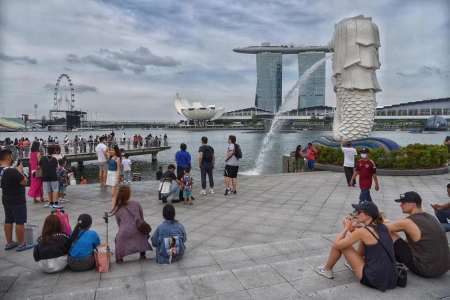S’pore taking moderate approach to Covid-19 border measures
While other nations have taken a wide variety of approaches to their Covid-19-related border measures, Singapore is taking the middle road and is not discriminating against any country as severe cases can originate anywhere, Minister for Health Ong Ye Kung said on Monday.
Delivering a ministerial statement in Parliament, Mr Ong noted that Singapore currently requires that incoming travellers either be fully vaccinated – according to the World Health Organisation’s (WHO) definition – or take a pre-departure test if not fully vaccinated.
Spain recently imposed similar requirements on travellers from China, he noted.
Countries such as Australia, India and the United States have imposed a blanket pre-departure test requirement on all travellers from China.
But others, including most countries in Asean and the Middle East, have not imposed any border measures.
Singapore’s approach is “neither the tightest nor the most liberal, but somewhere in between”, said Mr Ong.
These measures, in addition to controls on the number of travellers, have ensured few severe cases coming from China, even as the coronavirus is spreading widely there, he said.
Imported infections today account for between 5 per cent and 10 per cent of all Covid-19 cases detected here, Mr Ong said.
Still, the measures in use may not work forever, he noted.
“We will continually assess the situation and, if need be, make adjustments or implement new measures,” he said, adding that the Republic’s decisions would be based on “science, evidence and data”.
The main concern now is that with Covid-19 continuing to spread internationally, there is a greater chance that a new variant of concern may emerge from anywhere, Mr Ong said.
Such a variant could escape vaccine protection, as well as be more infectious and lead to more severe cases, knocking Singapore “almost back to square one”, he said.
This may lead to the Republic needing to reinstate measures such as strict border controls and quarantine for travellers, as well as limits on group sizes, until such time that a new, effective vaccine is developed.
“New variants can emerge from anywhere in the world, not just China,” said Mr Ong.
While pre-departure tests on travellers from China, such as those imposed by some countries, can detect Covid-19 infections, such tests cannot detect new variants of concern.
Detecting new variants of concern requires an “effective global surveillance system”, such as the Covid-19 genomic-sequence platform run by non-profit organisation Gisaid, which Singapore actively contributes to.
Gisaid data shows that the surge in China is driven by existing variants, which are already circulating in other regions, said the minister.
“Our local sequencing efforts on infected travellers from China further support this. The majority are BA.5.2 and BF.7 strains, which have already been detected in Singapore and other countries for many months,” he said.
This is consistent with findings from the WHO’s technical advisory group on virus evolution that were released last Wednesday, he noted.
While a new, dangerous variant that evades vaccine protection emerging from China has not materialised, Singapore will continue to remain vigilant, said Mr Ong.
Get The New Paper on your phone with the free TNP app. Download from the Apple App Store or Google Play Store now


